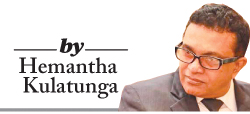 It is revealed that nearly five billion people (63 percent of the total world population) around the world now use social media, and the number continues to grow by leaps and bounds. Capturing and improving human interaction is one of the primary goals of social media platforms.
It is revealed that nearly five billion people (63 percent of the total world population) around the world now use social media, and the number continues to grow by leaps and bounds. Capturing and improving human interaction is one of the primary goals of social media platforms.
Persons and groups can interact speedily and effectively with each other and share ethically and emotionally strong feelings and ideas. However, the pertinent question is whether all social media users abide by those sentiments and play fair. The simple answer is that it is not so.
The bitter truth is that often social media platforms act as accelerants to amplify outrage and status enhancements, creating intergroup conflicts. The most vulnerable group for online abuse is adolescents, who can be easily exposed to moral disengagement leading to harmful and unethical behaviour. The danger of losing an honourable, honest, and morally advanced future generation of Sri Lanka is at stake today due to unregulated negative social media content.
Alarming data
The World Health Organization (WHO) expresses concerns over the issue. According to them, one in seven 10- to 19-year-olds experiences a mental disorder. Depression, anxiety, and behavioural disorders are among the leading causes of illness and disability among youth. According to the WHO, the consequences of failing to address this grave issue that can extend to adulthood can limit opportunities to lead fulfilling lives as adults.
In Sri Lanka, according to statistics, the two most popular platforms are YouTube, which stands at 43.42 percent, and Facebook, which stands at 38.18 percent, out of the 7.2 million (32 percent of the total population) social media users in Sri Lanka. In reality, both platforms are being misused heavily, often times with various types of despicable posts and programs that lead to negative social reactions.
Impact on mental health
The most alarming concern associated with social media use among youth is its injurious impact on mental health. Constant exposure to fabricated and often unrealistic content can damage the developing brain of an adolescent. A social media platform with such questionable information by way of posts, likes, and comments can contribute to a culture of comparison that could aggravate anxiety and depression among young users.
The crucial period of developing emotional habits to interact with society most takes place during adolescence. The right balance of habits is exceedingly essential for mental well-being. These include physical interactions with peers, interpersonal skills, and managing emotions when dealing with others.
Particularly, the “FOMO” (fear of missing out) that is created involuntarily through social media can worsen the mental stability of youth as users might misinterpret that their peers engaging in seemingly exciting and fulfilling activities. The pressure to conform to societal expectations, often fuelled by impractical and falsely idealised lifestyles on these platforms, can intensify feelings of isolation and loneliness among the youth.
 Another negative consequence of social media abuse among youth predominantly, and other social media users is the escalating problem of digital addiction. Social media interactions are often fake and inauthentic. Content on social media can be fabricated, edited, and unrealistic. Many youngsters, observing these as real, compare themselves and their lives to what is depicted in these images and try to measure up.
Another negative consequence of social media abuse among youth predominantly, and other social media users is the escalating problem of digital addiction. Social media interactions are often fake and inauthentic. Content on social media can be fabricated, edited, and unrealistic. Many youngsters, observing these as real, compare themselves and their lives to what is depicted in these images and try to measure up.
The addictive nature of social media platforms, designed to captivate users with endless scrolling and notifications, can have a detrimental impact on the well-being of youth. Excessive use of social media has been linked to disrupted sleep patterns, decreased academic performance, and a decline in physical health.
The constant need for validation through likes and comments can create a cycle of dependence, where young individuals find it challenging to disengage from the digital world. This addiction not only hampers personal development, but also contributes to a sedentary lifestyle, further exacerbating health issues among the youth.
The digital dependence of teens and young adults can severely affect real-life relationships in a negative manner. The incessant flow of social media notifications can displace attention from real-life interactions. This can lead to social isolation, and extended periods of isolation not only impact mental health, but also the physical well-being of a youth. People are social creatures, and lacking support and contact with others can contribute to loneliness, cognitive decline, anxiety, and depression.
Reliance on online communication
Excessive reliance on online communication can hinder the development of face-to-face social skills, making it challenging for young people to navigate real-world interactions. The ability to empathise, communicate effectively, and resolve conflicts is essential for personal and professional success, yet constant digital engagement can impede the honing of these skills.
Research reveals that people are more likely to make moral judgements based on the views of their social media acquaintances and the negative information they consume. For example, anti-religious content published constantly can harm traditional religious beliefs where the moral values of society are enhanced. Dubious elements can also promote such sentiments for financial gains that can lead to religious disharmony.
Misinformation is false or misleading information that is spread intentionally or unintentionally. Currently, this is an extremely worrying social issue in Sri Lanka that keeps disrupting peace in the country. Misinformation, disinformation, and hate speech on religious beliefs, political ideologies, personal preferences, sexual orientations, and even nationally important events are subjected to petty attacks through social media, creating disharmony among people.
Should social media content be regulated? If the question is asked by the public, a vast majority of them will eagerly consent.
Only those who publish undesirable content will oppose a regulatory mechanism in the country. Serious discussions on how social media platforms should be regulated to minimise their social costs are critically needed. However, the more difficult task will be to align such regulations with the provisions of the constitutional right to freedom of speech.
Amidst the agreement of the majority and the stiff obstruction of the opposition parties, the Online Safety Bill was passed in Parliament recently. The purpose of the Bill is to provide safety from the damage caused by the communication of prohibited statements, prohibit the use of inauthentic online accounts for prohibited purposes, and so forth. However, according to the media, the Cabinet of Ministers recently approved certain amendments to be included in the Bill.
The negative impact of social media abuse is a multifaceted issue with far-reaching consequences. From the deterioration of mental health to the escalation of cyberbullying, addiction, and the erosion of interpersonal skills, the repercussions are profound. It is crucial for society, educators, parents, and policymakers to address this issue collectively.
Implementing strategies that promote digital literacy, mental health awareness, and responsible online behaviour can contribute to mitigating the negative effects of social media abuse among youth, ensuring a healthier and more balanced use of these powerful communication tools.









